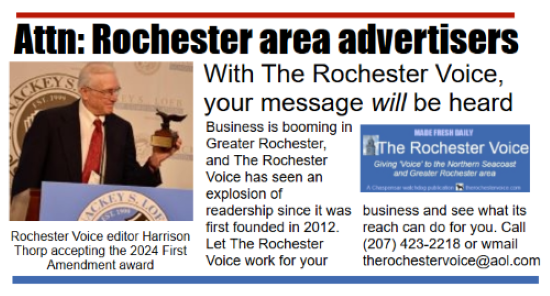
Editor's note: This is one in an occasional series focusing on The Rochester Voice v. City of Rochester complaint over the city's refusal to honor digital Right to Know requests made by The Rochester Voice. The city of Rochester contends it doesn't have to comply with such requests, because Rochester Voice editor Harrison Thorp is not a New Hampshire citizen.
CONCORD - Senate President Jeb Bradley is facing bipartisan criticism today after he killed HB 1069, which would have enshrined in state statute the right for The Rochester Voice to receive 91-A protections for receiving government documents under the Right to Know law.
Bradley, R-Wolfeboro, was part of a seven-member committee of conference that met on Monday to iron out differences between the House and Senate versions of HB1069.
A conference committee is a temporary, ad hoc panel composed of House and Senate conferees formed for the purpose of reconciling differences in legislation that has passed both chambers.
But Bradley had no intention of doing what a committee of conference is supposed to do, said State Rep Marjorie Smith, a Democrat who represents Strafford 10.
"He could have saved us a lot of time," Smith said on Wednesday.
After a little over half an hour of negotiations led by State Rep Bob Lynn, the committee chair, Bradley spoke about how he was deluged with emails and calls from municipal officials and the New Hampshire Municipal Association claiming this would wreak havoc with municipal governments.
Bradley had little to say during the brief meeting, but toward the end of the discussion he laid down his concerns regarding the bill.
"I can't agree with this," he said. "Town managers (and) local officials say this is opening up a Pandora's Box. I don't know if we know the ramifications of this, and I'm not sure I'll be able to agree with this. I''m not ready to say this is a good idea."
Which infuriated Smith, she said on Wednesday.
"If a member of the (committee of conference) is unwilling to work to a resolution of the two bills, you could ask them to be replaced," she fumed. "But he's the president of the Senate, there was nothing we could do. He wasted all our time, it was not a pleasant experience and I was greatly disappointed."
Lynn, who said all four state reps on the committee were in favor of HB1069, said he was flabbergasted by Bradley's reversal just weeks after he voted for the Senate version of the bill.
"I don't know what part of this he objects to, because I cannot believe that he thinks that (The Rochester Voice) shouldn't gets Right to Know documents from the City of Rochester," he said.
Lynn added that the definition of "citizen," which the City of Rochester defines as a citizen of New Hampshire, has no court cases backing that theory up.
"We don't have nay court cases defining what citizen means," Lynn told The Voice on Wednesday. "If they (state of NH) defined it as citizen of the United States, that would be the end of his argument."
The New Hampshire Municipal Association, which heavily peddled the rejection of HB1069, has often sought to portray that the bill would cause a deluge of out-of-state requests for Right to Know documents, but Lynn poured cold water on that argument, too.
"The reality is if one of these out-of-state requesters really wanted to obtain Right to Know documents they could easily get someone who lives in the state to request them," said Lynn, a former Chief Justice of the New Hampshire Supreme Court.
Smith also laid the blame of HB1069's demise at the feet of the New Hampshire Municipal Association, which has consistently refused to return phone calls from The Rochester Voice.
"In fact the real stumbling block on the surface was Sen. Bradley, but in terms of process, it was the NHMA," she said.
As of today the Committee of Conference report on HB1069 has still not been filed on the state's General Court website.
The Rochester Voice reached out to outgoing Senate President Bradley over two days at multiple contact points, but he never returned a call.
Meanwhile, an appeal filed in Strafford Superior Court by the City of Rochester of the RTK Ombudsman's decision regarding The Rochester Voice's RTK complaint against the city is awaiting a decision by Strafford Superior Court Judge Daniel E. Will.














